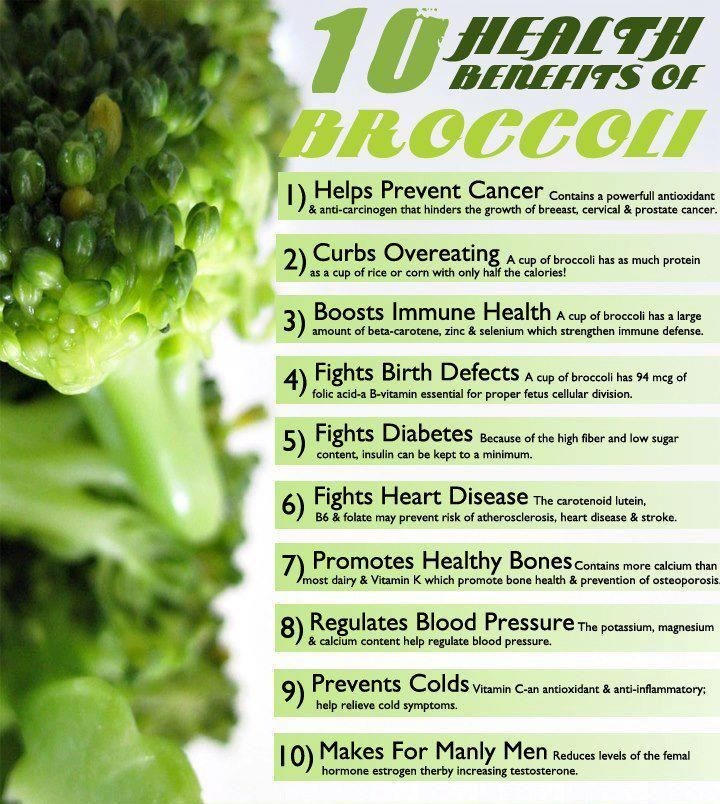
Contents
What Are the Nutritional Benefits of Broccoli? 11 Benefits
Broccoli is a low-calorie and nutrient-rich vegetable that provides 9 health benefits:
Broccoli belongs to the cruciferous vegetable family, along with kale, cauliflower, Brussels sprouts, bok choy, cabbage, collard greens, rutabaga, and turnip. It is an edible green plant with a large blooming head that is commonly consumed as a vegetable. It consists of green blossom heads arranged in a tree-like pattern on a sturdy, edible stem.
The best ways to enjoy broccoli while retaining its nutrients are by steaming, baking, sauteing, or grilling it.
Broccoli is loaded with vitamins and minerals, including a higher vitamin C content than oranges and no fat. The nutritional composition of broccoli varies depending on whether it is eaten raw or cooked. Boiling broccoli may lead to a loss of water-soluble vitamins and other compounds.
| 31 | |
| 6 g | |
| 2.5 g | |
| 2.5 g | |
| 90% of DV | |
| 77% of DV | |
| 9% of DV | |
| 14% of DV | |
| 6% of DV | |
| 5% of DV | |
| 8% of DV | |
| 5% of DV | |
| 5% of DV | |
| **DV = Daily Value | |
In addition, broccoli also contains various minerals:
11 health benefits of broccoli:
Broccoli is packed with vitamins, minerals, and antioxidants that can help prevent cellular-level conditions. The health benefits include:
- Reduces the risk of cancer: Studies show that broccoli, a cruciferous vegetable, is rich in antioxidants that protect the DNA in cells from damage. Consuming broccoli as a whole plant or as extracts may help prevent cancer. Cruciferous vegetables also contain indole-3-carbinol, which has powerful anticancer properties. A half cup of chopped raw broccoli contains 27 mg of glucosinolates, which break down into indole-3-carbinol and support cellular regeneration and repair.
- Reduces the risk of cardiovascular events: Broccoli contains vitamin K, which helps prevent blood clots and cardiovascular events. It also promotes heart health by providing fiber, fatty acids, and vitamins that regulate blood pressure and reduce harmful cholesterol. Broccoli also protects blood vessels from damage. One cup (91 grams) of raw broccoli contains 2.5 grams of fiber and is a rich source of vitamin K, providing 77% of the DV.
- Anti-inflammation: Broccoli contains sulforaphane, which has anti-inflammatory properties. It also has high levels of omega-3 fatty acids, another anti-inflammatory substance. These qualities make broccoli beneficial for patients with arthritis as it inhibits enzymes that worsen joint degeneration and cause inflammation. The highest amount of sulforaphane is found in 5-day-old broccoli sprouts, with 233.80 mcg/g DW. One cup (91 grams) of raw broccoli contains 19.1 mg of omega-3 fatty acids.
- Improves brain health: The nutrients and bioactive compounds in broccoli promote nerve tissue function and protect against age-related cognitive decline.
- Prevents osteoporosis: Vitamin C and calcium are essential for bone health. Vitamin C helps produce collagen, a crucial protein for bone development, and vitamin K in broccoli helps prevent osteoporosis and maintain strong bones. One cup (91 grams) of raw broccoli provides 90% of the DV for vitamin C and 77% of the DV for vitamin K.
- Boosts immunity: Vitamin C supports the immune system, reduces symptoms of the common cold, and helps prevent cardiovascular disease, cataracts, and anemia. One cup (91 grams) of raw broccoli contains 90% of the DV for vitamin C.
- Improves skin health: Vitamin C is essential for collagen production, which is crucial for skin, hair, and nail health. It also prevents skin damage, such as wrinkles and the aging process. Additionally, vitamin C treats and prevents skin diseases like shingles. One cup (91 grams) of raw broccoli contains 90% of the DV for vitamin C.
- Improves digestion: Broccoli is high in fiber, which promotes regularity, prevents constipation, and improves digestive health. It also increases nutrient absorption and may reduce the risk of colon cancer. One cup (91 grams) of raw broccoli contains 2.5 grams of fiber.
- Detoxification: Naturally occurring molecules in broccoli act as detoxifiers, deactivating harmful substances and aiding their removal from the body.
- Improves eye health: Sulforaphane in broccoli stabilizes DNA methylation patterns in cells, which has a strong correlation with the aging process. Broccoli is rich in antioxidants like lutein and zeaxanthin, which protect eye cells from oxidative stress and damage. These antioxidants increase macular pigment and help prevent age-related macular degeneration, a condition that can cause vision loss and blindness. Broccoli is also high in beta-carotene (vitamin A), which prevents night blindness and reduces the risk of other eye conditions like cataracts. One cup (91 grams) of raw broccoli contains 1,270 mcg of lutein and zeaxanthin and 329 mcg of beta-carotene.
- Aids in weight loss: Broccoli is low in calories, high in soluble fiber, and rich in proteins and water. This combination makes it a filling food that aids in weight loss and reduces excess calorie intake. One cup (91 grams) of raw broccoli contains 2.5 grams of fiber, 2.5 grams of protein, and 81.3 grams of water.
QUESTION
What are the possible side effects associated with broccoli?
Broccoli may interact with medications or worsen specific medical conditions, including:
Blood thinners
Broccoli is rich in vitamin K, which plays a role in blood clot formation. Taking vitamin K alongside blood thinners may affect the medicine’s function and increase the risk of blood clots. While avoiding broccoli completely is unnecessary for individuals taking blood thinners, it is recommended to control dietary vitamin K intake.
Irritable bowel syndrome (IBS)
Broccoli contains high fiber and poorly absorbed FODMAPs (fermentable oligosaccharides, disaccharides, monosaccharides, and polyols). While raw broccoli is safe to eat, it can cause excessive gas, bloating, and bowel issues. Individuals with IBS are advised to avoid broccoli to prevent discomfort.
Kidney issues
Broccoli contains phosphorus, which may lead to an accumulation in individuals with kidney problems. Therefore, those with kidney issues should consider limiting their broccoli consumption.
Hypothyroidism
Individuals with hypothyroidism or other thyroid issues should restrict their consumption of broccoli as it may exacerbate symptoms such as fatigue, slow heart rate, weight gain, depression, muscle fatigue, intolerance to cold temperatures, hair loss, dry skin, a puffy face, constipation, and difficulty concentrating.


